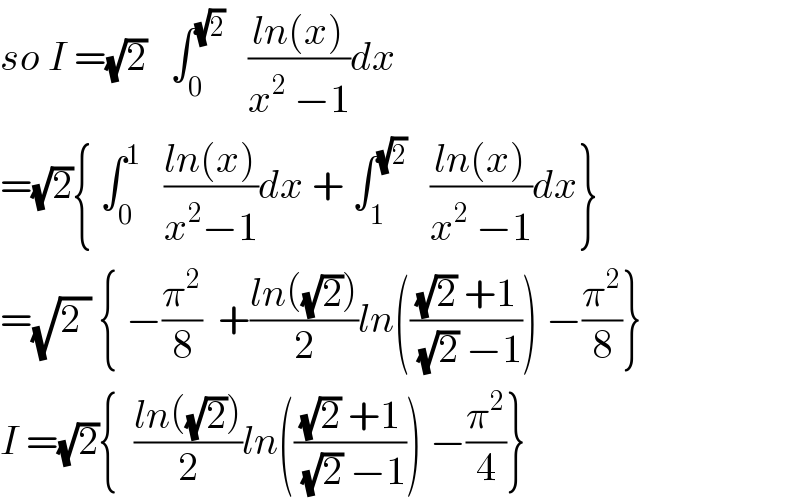Question Number 35241 by abdo mathsup 649 cc last updated on 17/May/18

Commented by abdo.msup.com last updated on 17/May/18
![let put I=∫_0 ^π ((xdx)/(3 +cosx)) .changement tan((x/2))=t give x =2arctan(t) and I = ∫_0 ^∞ ((2arctan(t))/(3 +((1−t^2 )/(2+t^2 )))) ((2dt)/(1+t^2 )) = 4∫_0 ^∞ ((arctan(t))/(3 +3t^2 +1−t^2 ))dt =4 ∫_0 ^∞ ((arctan(t))/(4 +2t^2 ))dt=2∫_0 ^∞ ((arctan(t))/(2 +t^2 )) =_(t=x(√2)) 2∫_0 ^∞ ((arctan(x(√2)))/(2(1+x^2 )))(√2) dx =(√2) ∫_0 ^∞ ((arctan(x(√2)))/(1+x^2 ))dx let introduce the parametric function f(t) =∫_0 ^∞ ((arctan(tx))/(1+x^2 ))dx f^′ (t) = ∫_0 ^∞ (x/((1+t^2 x^2 )(1+x^2 )))dx =_(tx =u) ∫_0 ^∞ (u/(t(1+u^2 )(1+(u^2 /t^2 )))) (du/t) = ∫_0 ^∞ (u/((1+u^2 )(t^2 +u^2 )))du let decompose g(u)= (u/((u^2 +1)(u^2 +t^2 ))) g(u) = ((au +b)/(u^2 +1)) +((cu +d)/(u^2 +t^2 )) g(−u) =−g(u) ⇒b=d=0 so g(u)= ((au)/(u^2 +1)) +((cu)/(u^2 +t^2 )) lim_(u→+∞) u g(u)=0 = a+c ⇒c=−a g(u)= ((au)/(u^2 +1)) −((au)/(u^2 +t^2 )) g(1)=(1/(2(1+t^2 ))) = (a/2) −(a/(t^2 +1)) ⇒ (1/2) =(1/2)(1+t^2 )a −a ⇒ 1=(1+t^2 )a −2a =(t^2 −1)a ⇒ a= (1/(t^2 −1)) if t^2 ≠1 so g(u) = (1/(t^2 −1)) (u/(1+u^2 )) −(1/(t^2 −1)) (u/(t^2 +u^2 )) f^′ (t) =∫_0 ^∞ g(u)du =(1/(1−t^2 )){ ∫_0 ^∞ (u/(1+u^2 ))du −∫_0 ^∞ (u/(u^2 +t^2 ))du} = (1/(2(1−t^2 )))[ ln(1+u^2 )−ln(u^2 +t^2 )]_0 ^(+∞) = (1/(2(1−t^2 )))[ln(((u^2 +1)/(u^2 +t^2 )))]_0 ^(+∞) = (1/(2(1−t^2 ))) {ln(t^2 )= ((ln(t))/(1−t^2 )) f^′ (t) = ((ln(t))/(1−t^2 )) ⇒f(t)= ∫_0 ^t ((lnx)/(1−x^2 ))dx +λ λ=f(0)=0 ⇒ f(t)= ∫_0 ^t ((ln(x))/(1−x^2 ))dx I =(√2) f((√2))= (√2) ∫_0 ^(√2) ((ln(x))/(1−x^2 ))dx... be continued...](https://www.tinkutara.com/question/Q35283.png)
Commented by abdo.msup.com last updated on 17/May/18

Commented by abdo mathsup 649 cc last updated on 20/May/18
![∫_0 ^(√2) ((lnx)/(x^2 −1))dx = −∫_0 ^1 ((lnx)/(1−x^2 ))dx +∫_1 ^(√2) ((lnx)/(x^2 −1))dx but ∫_0 ^1 ((ln(x))/(1−x^2 ))dx =∫_0 ^1 (Σ_(n=0) ^∞ x^(2n) )lnxdx =Σ_(n=0) ^∞ ∫_0 ^1 x^(2n) ln(x)dx by parts A_n = ∫_0 ^1 x^(2n) ln(x)dx =[(1/(2n+1))x^(2n+1) ln(x)]_0 ^1 − ∫_0 ^1 (1/(2n+1))x^(2n+1) (1/x)dx = −(1/((2n+1)^2 )) ∫_0 ^1 x^(2n) dx =−(1/((2n+1)^2 )) ⇒ ∫_0 ^1 ((ln(x))/(1−x^2 ))dx =−Σ_(n=0) ^∞ (1/((2n+1)^2 )) we have (π^2 /6) =Σ_(n=1) ^∞ (1/n^2 ) =Σ_(n=1) ^∞ (1/((2n)^2 )) +Σ_(n=0) ^∞ (1/((2n+1)^2 )) =(1/4) Σ_(n=1) ^∞ (1/n^2 ) +Σ_(n=0) ^∞ (1/((2n+1)^2 )) ⇒ Σ_(n=0) ^∞ (1/((2n+1)^2 )) = (3/4) Σ_(n=1) ^∞ (1/n^2 ) =(3/4) (π^2 /6) = (π^2 /8)](https://www.tinkutara.com/question/Q35522.png)
Commented by abdo mathsup 649 cc last updated on 20/May/18
![⇒ ∫_0 ^1 ((ln(x))/(x^2 −1))dx =−(π^2 /8) changement x=(1/t) give ∫_1 ^(√2) ((ln(x))/(x^2 −1))dx = ∫_1 ^(1/( (√2))) ((−ln(t))/(( (1/t^2 ) −1))) (−(dt/t^2 )) = −∫_(1/( (√2))) ^1 ((ln(t))/(1−t^2 ))dt =−∫_(1/( (√2))) ^1 (Σ_(n=0) ^∞ t^(2n) )ln(t)dt =−Σ_(n=0) ^∞ ∫_(1/( (√2))) ^1 t^(2n) ln(t)dt =−Σ_(n=0) ^∞ A_n by parts A_(n ) = [ (1/(2n+1))t^(2n+1) ln(t)]_(1/( (√2))) ^1 − ∫_(1/( (√2))) ^1 (1/(2n+1))t^(2n) dt =(1/(2n+1))((1/( (√2))))^(2n+1) ln((√2)) −(1/((2n+1)^2 )) ⇒ Σ_(n=0) ^∞ A_n = ln((√2))Σ_(n=0) ^∞ (1/(2n+1))((1/( (√2))))^(2n+1) −Σ_(n=0) ^∞ (1/((2n+1)^2 )) ⇒ ∫_1 ^(√2) ((ln(x))/(x^2 −1))dx = ln((√2))Σ_(n=0) ^∞ (1/((2n+1)^2 ))((1/( (√2))))^(2n+1) −(π^2 /8)](https://www.tinkutara.com/question/Q35523.png)
Commented by prof Abdo imad last updated on 20/May/18

Commented by prof Abdo imad last updated on 20/May/18

Answered by math1967 last updated on 17/May/18
![∫_(0 ) ^π ((xdx)/(3+2cos^2 (x/2)−1))=∫_(0 ) ^π ((xdx)/(2(1+cos^2 (x/2)))) now 2I=π∫_0 ^π (dx/(2(1+cos^2 (x/2)))) =(π/2)∫_0 ^π ((sec^2 (x/2)dx)/(sec^2 (x/2)+1)) =π∫_0 ^π (((1/2)sec^2 (x/2)dx)/(2+tan^2 (x/2))) =π∫_0 ^π ((d(tan(x/2)))/(((√2))^2 +tan^2 (x/2)))=π[(1/( (√2)))tan^(−1) tan (x/(2(√2)))]_0 ^π =π×[(1/( (√2)))×(π/(2(√2)))]=(π^2 /4)∴I=(π^2 /8) plz. check](https://www.tinkutara.com/question/Q35261.png)
Commented by MJS last updated on 17/May/18

Commented by math1967 last updated on 17/May/18

Answered by math1967 last updated on 17/May/18
![2I=∫_0 ^π ((xdx)/(3+cosx))+∫_0 ^π (((π−x)dx)/(3+cos(π−x))) =π∫_0 ^π ((6dx)/((3+cosx)(3−cosx))) =6π∫_0 ^π (dx/(9−cos^2 x))=6π∫_0 ^π ((sec^2 xdx)/(9sec^2 x−1)) =6π∫_0 ^π ((sec^2 xdx)/(8+9tan^2 x))=2π∫_0 ^π ((3sec^2 xdx)/((2(√(2 )))^2 +(3tan x)^2 )) =2π∫_0 ^π ((d(3tanx))/((2(√2))^2 +(3tan x)^2 )) =2π[(1/(2(√2)))tan^(−1) ((3tan x)/(2(√2)))]_0 ^π =2π[(1/(2(√2)))×(π/2) −0] =(π^2 /(2(√2))) ∴ I=(π^2 /(4(√2)))](https://www.tinkutara.com/question/Q35254.png)
Commented by MJS last updated on 17/May/18

Commented by math1967 last updated on 17/May/18

